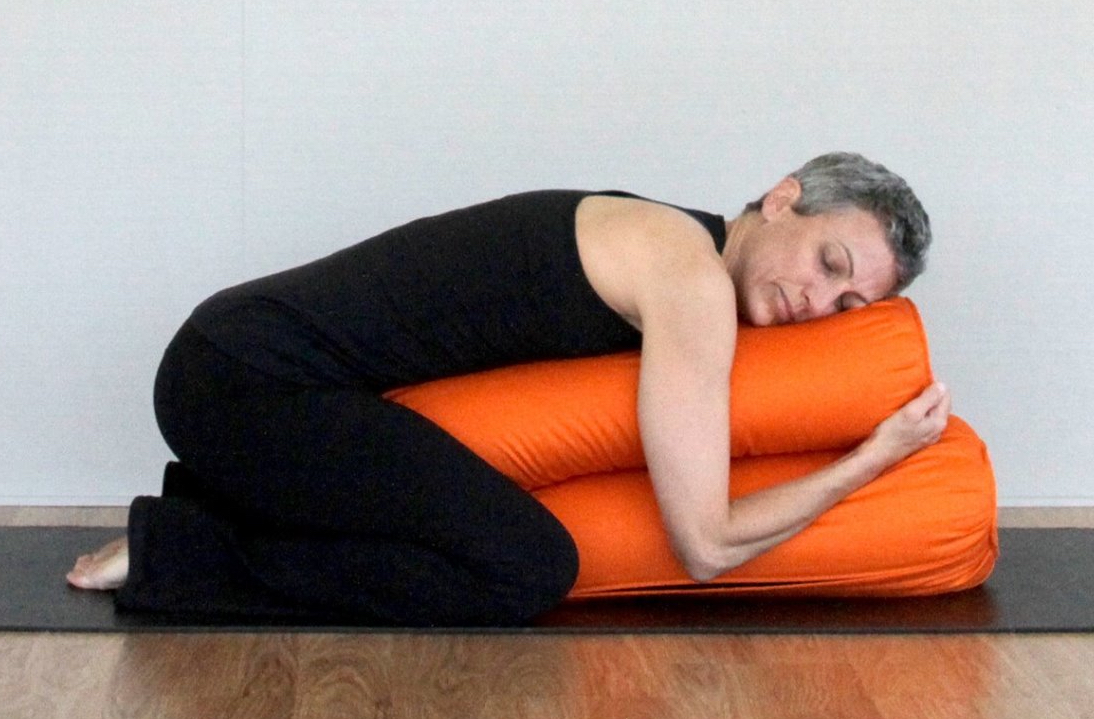How does Yoga support our wellbeing?
Yoga offers a way for humans to thrive and maintain equilibrium in the face of impermanence. It does this by putting us in touch with that within us which is essential, unconditioned and unchanging in ourselves.
Doesn’t that sound nice? But what does that actually mean in practical terms?
It means that by having a home practice – one that brings us into stillness and awareness of our body, breath and mind – we are better able to know our essential nature, and tap into our deeper intentions. There’s a lot of research out there to demonstrate that yoga can help support mental as well as physical wellbeing. This is also a growing area of interest in the yoga community.
What about Postnatal Yoga?
Postnatal Yoga can offer valuable tools to negotiate the mental, physical and emotional changes women experience postpartum. In the prenatal period, and even before this (before conception), a regular yoga practice can give the opportunity to stock up resources into what can later become a sort of yogic ‘postnatal survival kit’.
In the same way we cook extra lasagnas and soups and put them in the freezer for days when we have no capacity to cook, we can adapt our existing yoga practice to prepare for the transition to motherhood. Through this, we can give ourselves the resources to maintain our mental and physical health after birth.
How do we do this?
It doesn’t require detailed understanding of the neurobiology of mental health to know that it is near impossible to think clearly or learn well when we are stressed or tired. In fact, this is why having a home practice is so difficult for so many of us; We literally can’t think of what to do at home without having the voice of a teacher to follow.
Add to this the demands of caring for a baby, interrupted sleep, and negotiating the changes in a postnatal body, and it is easy to put yoga into the too hard basket.
If, on the other hand, prenatal, and even pre-pregnancy yoga practices focus on developing accessible, sustainable practices and rituals, these resources will be available within the postnatal period like soups and lasagnas in the freezer.
Three practices for Postnatal wellbeing
So what resources should we have in our proverbial freezers? Or another way to think of it is what staple poses and practices do we need in our pantry? Here are my top three:
-
A refuge pose

A really comfy relaxing pose that you could hang out in for 5 -15 minutes with the only danger being that you dribble a bit on the bolster. My favourites, which are beautifully nurturing postnatally, are a supported Balasana (Child’s pose) using two bolsters (pictured), Setu Bandha Sarvangasana (Bridge pose) resting the buttocks on a low block, and Viparita Karani (legs up the wall). (Several variations of these Restorative Yoga postures are shared in the Bliss Baby Yoga Online Prenatal and Postnatal Yoga Teacher Training course and Online L1 & L2 Restorative Yoga Teacher Training courses).
-
A movement routine
A 15 to 20-minute sequence of poses that you could do with your eyes closed and that make you feel refreshed. Sequences take a while to develop, but chances are the warm up routine from your favourite class is a good go to. Bliss Baby Yoga teachers might be familiar with the Yoga for Grownups floor based warm up routine, and a legs up the wall routine (click here for a free audio download of these practices). I also find the traditional Pawanmuktasana series useful – a beautiful Prenatal variation on this can be found in the Bliss Baby Yoga Online Prenatal Yoga Teacher Training course.
-
A de-stress practice e.g. a Pranayama or Meditation:
Breathwork is the quickest way to make effective, palpable changes to the nervous system, so focusing on the breath will be beneficial. To calm the body, focus on exhalations and pause after exhalation as in a Krishnamacharya style practice. My personal favourite is starting in child pose with arms reaching forward, inhale up to all fours, then humming, exhale slowly back to child and pause, repeating 6 times. Alternatively to pep up, focus on inhalation and move the arms either up to the sky or out to the side to bring in the prana.
With these practices in my yoga pantry, I am always equipped and have the resources I need when I get a bit frazzled. As soon as a I feel off centre, breathless or even brain fogged, I choose one of the above and I know I can regain my centre and find myself again.
But remember, it’s harder to develop these resources while tired and stressed. Use the good days, the calm times, to develop sustainable, accessible yoga resources that you can come back to in tough times, again and again.
If you are passionate about nurturing women during pregnancy and postnatally, and offering holistic yoga classes with safe, appropriate and nourishing practices designed specifically for pregnant women and new mothers, you may be interested in our Bliss Baby Yoga Online Prenatal & Postnatal Yoga Teacher Training course. We also offer Online Extension Modules to enhance and further your learning in this area, covering topics including Perinatal Nutrition & Ayurveda, Prenatal & Postnatal Anatomy and Physiology and Pelvic Floor Anatomy and Physiology for Women’s Health.
Maria Kirsten, founder of Yoga for Grownups and co-host of the Live Like You Love Yourself Podcast, is an Occupational Therapist, Yoga Therapist, Yoga Teacher and Teacher Trainer, and specialist in Applied Anatomy & Physiology for yoga teachers, Yoga for Mental Health, and Yoga for Seniors and Older Grownups. Maria facilitates workshops and teacher training courses throughout Australia and internationally, and is driven by a passion to make yoga safe and accessible for everyone. Maria is a special guest presenter on our Bliss Baby Yoga Online Prenatal & Postnatal Yoga Teacher Training course, sharing safe postnatal yoga practices. You can also connect with Maria on instagram via @yogaforgrownups.
*Our dear friend and colleague Maria sadly passed away in April 2021. You can learn about Maria’s life and work, and her journey with cancer, via the episodes of the Live Like You Love Yourself podcast that she recorded with Chara Caruthers, and via her website (both linked above). She was an inspiration, and made the most of every moment she was given. She is greatly missed, but the legacy of her passion for yoga continues through all of the students and teachers she taught over many years, and all of the incredibly valuable resources she left for us all to continue to learn from – which was her wish. We are eternally grateful for Maria. She is forever in our hearts.
Further Reading related to this topic:
- Self-Care Tips for New Mamas by Star Despres
- Dr. Lauren Tober discusses Postnatal Depression
- 3 Keys to Postpartum Pelvic Floor Recovery with Lisa Fitzpatrick
- The Sādhanā of Motherhood: tips for integrating yoga into daily life by Nadine O’Mara
- Healing the wound: How can we best support mothers after caesarian? by Nadine O’Mara


Comments are closed.